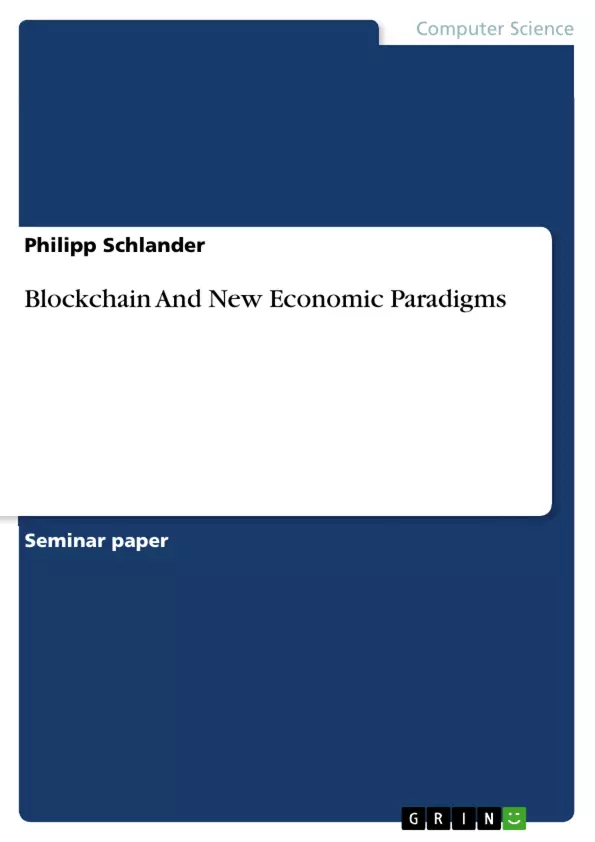During the past years arising technologies and globalization have forced institutions and companies dealing within different challenges of digitalization. Systems and applications have become more complex and interconnected, setting a difficult problem for the current legacy systems and applications.
With the invention of Bitcoin in 2008 by a person or group of people known by pseudonym “Satoshi Nakamoto”, a solution to the challenges of globalization and digitalization was introduced to the world. Not Bitcoin as a cryptocurrency by itself, but the system Bitcoin is based on: blockchain technique. This new technology promises to radically alter the existing paradigms of nearly all industries including IT, finance, government, media, medical, energy and law as the most important ones. The topic of this seminar paper is to elaborate the revolutionary implications of blockchain on different sectors and to glance at possible future aspects of blockchain’s potentials setting a new paradigm.
Inhaltsverzeichnis (Table of Contents)
- Introduction
- Blockchain Overview
- Distributed Power
- Paradigm Shift
- Benefits of blockchain
- Cost Efficiency:
- Transparency & Trust:
- Immutability:
- Security:
- Time efficiency:
- Sample Use Cases on blockchain
- Blockchain as a catallaxy
- Conclusion:
Zielsetzung und Themenschwerpunkte (Objectives and Key Themes)
This seminar paper aims to explore the revolutionary implications of blockchain technology on different sectors and to anticipate potential future aspects of its impact on shaping a new paradigm. It seeks to understand how blockchain's decentralized nature can disrupt existing centralized systems and create more efficient, transparent, and secure processes.
- Decentralization as a core benefit of blockchain technology
- The paradigm shift from centralized systems to decentralized ones
- The impact of blockchain on various industries, including finance, IT, and government
- Exploring the potential of blockchain to create a new economic paradigm
- Analyzing the advantages of blockchain, including cost efficiency, transparency, immutability, security, and time efficiency
Zusammenfassung der Kapitel (Chapter Summaries)
- Introduction: The paper introduces the concept of blockchain and its potential to revolutionize various industries by addressing challenges posed by globalization and digitalization.
- Blockchain Overview: This chapter delves into the fundamental elements of blockchain technology, emphasizing its decentralized nature and its ability to disrupt existing centralized systems. It explains how blockchain operates as a distributed ledger, simplifying information management and enhancing efficiency and security.
- Distributed Power: This section elaborates on the concept of distributed power within blockchain, highlighting its role in reducing the complexity of managing separate systems. It emphasizes how blockchain's decentralized nature makes it inherently more secure and efficient compared to traditional centralized systems.
- Paradigm Shift: The chapter explores the transformative potential of blockchain in shifting the paradigm from centralized systems to decentralized ones. It illustrates this shift through an example of financial transactions, comparing the traditional reliance on intermediaries with the direct, decentralized approach enabled by blockchain.
- Benefits of blockchain: This section outlines the advantages of blockchain technology, including cost efficiency, transparency, immutability, security, and time efficiency. It provides a detailed analysis of how these benefits can revolutionize various sectors and create a more efficient and secure environment for businesses and individuals.
- Sample Use Cases on blockchain: This chapter explores practical applications of blockchain technology across different industries, showcasing real-world examples of its potential impact. It delves into specific use cases and demonstrates how blockchain can be leveraged to improve existing systems and create new opportunities.
- Blockchain as a catallaxy: This section examines the potential of blockchain to create a new economic paradigm, exploring its impact on market dynamics and the emergence of decentralized marketplaces. It discusses how blockchain can facilitate peer-to-peer interactions, reduce reliance on intermediaries, and foster greater economic efficiency.
Schlüsselwörter (Keywords)
This seminar paper focuses on key concepts such as blockchain technology, decentralization, paradigm shift, distributed ledger, cost efficiency, transparency, immutability, security, time efficiency, and potential applications in various industries, including finance, IT, and government. It also explores the impact of blockchain on economic paradigms and its potential to create new marketplaces and economic systems.
Frequently Asked Questions
What is the main focus of the seminar paper on Blockchain?
The paper explores how blockchain technology acts as a revolutionary paradigm shift, moving from centralized systems to decentralized, transparent, and secure processes across various industries.
Who invented the first blockchain application, Bitcoin?
Bitcoin was introduced in 2008 by an individual or group using the pseudonym "Satoshi Nakamoto."
What are the core benefits of blockchain technology?
The key benefits include cost efficiency, transparency, trust, immutability (data cannot be changed), enhanced security, and time efficiency.
Which industries can be transformed by blockchain?
Blockchain has the potential to alter sectors such as finance, IT, government, media, healthcare, energy, and law.
What is meant by the term "catallaxy" in the context of blockchain?
It refers to the potential of blockchain to create a new decentralized economic order where peer-to-peer interactions and market dynamics function without central intermediaries.
- Quote paper
- Philipp Schlander (Author), 2018, Blockchain And New Economic Paradigms, Munich, GRIN Verlag, https://www.hausarbeiten.de/document/480684


